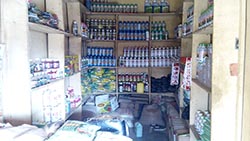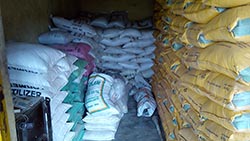My MSc Internship was undertaken from October 2016 to January 2017 with the Plant Production Systems (PPS) chair group at Wageningen University & Research and the N2Africa project. The purpose of my MSc Internship was to review aspects of the N2Africa project. The review process comprised of two studies, the Public- Private Partnership (PPP) study and the Quick Survey Study. These two studies will feed into the N2Africa project’s Annual Reporting for 2016.
|
The overall purpose of the PPP study was to gain insight into the results and progress made in relation to the building and development of PPPs in the eleven N2Africa countries. A database of N2Africa PPPs, further referred to as the ‘PPP Matrix’, was compiled together with Lorraine Odhiambo at IITA and included information on collaborating partners and their activities. The PPP Matrix data was analysed to provide evidence of the current status of N2Africa’s PPPs. The study demonstrates that from a quantitative perspective overall the PPPs that have been developed within the N2Africa project show strength, partners are engaging in activities and project targets are being achieved. Most countries have embraced the PPP strategy and achieved the project targets for PPP development, the project has, at the moment of research, 81 PPPs currently under agreement. Future opportunities for improving PPP documentation, data capture and further engagement of other collaborating and supporting partners at local level were presented. The creation of the PPP Matrix is a good foundation for further research and data collection to build upon to facilitate future evidence based evaluation of project interventions as implemented through project partners. I also evaluated the Quick Survey and Computer Aided Telephone Interview (CATI) approaches as tools for impact evaluation data collection. The main aim of the Quick Survey study was to assess whether change can be observed in farmers participating in the N2Africa project compared to non-participating farmers and whether any change observed can be related to the Outcomes and Impact indicators of the project Theory of Change (ToC). The Quick Survey was implemented as a Pilot study in Nigeria and Tanzania using the CATI approach. Although full Pilot results are not yet available the initial Pre-Pilot test results in Nigeria are promising. Interesting results presented by the Pre-Pilot test survey include, 43% of the N2Africa farmers surveyed used inoculant on their soya beans whereas inoculants were not used by any of the non-N2Africa farmers surveyed. Further, 67% of the N2Africa farmers surveyed sourced legume inoculants from agro-input dealers whereas in the project’s Early Impact survey 88% of farmers obtained their inoculants from NGOs or projects. Survey questions and farmer responses can be related to the project ToC and differences were observed between N2Africa farmers and non-N2Africa farmers. The resulting data was also found to be comparable to Baseline and Early impact survey data. The Quick survey study demonstrates that both the Quick survey and CATI approaches can provide useful results and are valuable tools for this type of data collection. |
Image 1-3. Agrochemical and Fertilizer Sales Outlet (Belongs to Mallam Bello Mohammed), Kawo Market, Kaduna City, Kaduna State Country in Nigeria |
Lisa Piper, Wageningen University & Research



